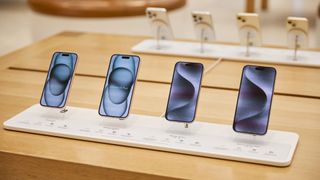DOJ: Apple has a monopoly and its stock buybacks prove it — Lack of R&D spending highlights competition issues
How much is enough?

Apple is currently in the Department of Justice's crosshairs after the bombshell news last week that the company is on the receiving end of a new antitrust lawsuit over the way it runs the iPhone's App Store. It's argued that Apple stifles innovation by controlling which apps and services can be made to work with the iPhone in an attempt to prevent competition for its own offerings and the lawsuit claims that the amount of money it spends on research and development is an example of that.
The lawsuit notes that while Apple spent a whopping $77 billion on a share buyback scheme in 2023, it only spent a relatively small amount of money on its R&D projects — just $30 billion. It's argued that Apple is able to spend so much on share buybacks, rather than choose to spend it on researching new technologies and features because it isn't currently under enough pressure to innovate. The company's lack of competition is the reason for that, it's claimed.
By comparison, Alphabet, Google's parent company, spends a similar amount of money on R&D as it does share buybacks, a fact that is seen by some as an example of how Apple should be spending its money. As ever, the situation is complicated, and share buybacks themselves are controversial.
A game of shares
The Financial Times notes that share buybacks are a relatively common thing in the tech industry so Apple's use of them is nothing new. The process involves a company buying shares to effectively lessen the number of shares that are available in the pool, effectively increasing the price of each individual share as a result. In an industry where executive pay can often be closely tied to stock options and performance, it's easy to see why stock buybacks might be a popular approach for businesses to take. But that isn't necessarily the issue that the DOJ has in this instance.
"By comparing the size of Apple’s buyback programme to its R&D spending, the DoJ is highlighting what it believes is Apple’s insulation from competition and lack of incentive to innovate — something it says harms consumers," the Financial Times report notes. "The department does not, however, mention the popularity of large-scale buyback programmes across the innovative tech sector."
It's fair to say that the DOJ's argument isn't the best it's made with regards to this latest lawsuit and some might argue that the connection between how much money Apple spends on buybacks and how much it spends is weak at best. But a weak connection is still a connection, and it's interesting to see the DOJ highlight it at this point.
Apple can of course spend its money however it wants, within reason. But the argument is clear — Apple is so comfortable that it believes spending money to buy its own shares is a better use of its money than researching new features and technologies. It's easy to see why that could be seen as a smoking gun to the DOJ, rightly or wrongly.
Master your iPhone in minutes
iMore offers spot-on advice and guidance from our team of experts, with decades of Apple device experience to lean on. Learn more with iMore!
Ultimately, it's perhaps more difficult to argue that there is something Apple should be spending that money on in terms of R&D. The company plowed money into the Apple Car project only to kill it, while it's now thought to be going full steam ahead with new Apple AI plans. And while some argue that Apple's iPhones haven't changed an awful lot in the last decade, they do have cutting-edge features — the iPhone 14 gained satellite emergency connectivity, for example.
Maybe Apple isn't spending more on R&D because it doesn't need to. But whether or not that's because there's no competition or because it's already making pretty great phones is a matter for the courts to decide.
More from iMore

Oliver Haslam has written about Apple and the wider technology business for more than a decade with bylines on How-To Geek, PC Mag, iDownloadBlog, and many more. He has also been published in print for Macworld, including cover stories. At iMore, Oliver is involved in daily news coverage and, not being short of opinions, has been known to 'explain' those thoughts in more detail, too. Having grown up using PCs and spending far too much money on graphics card and flashy RAM, Oliver switched to the Mac with a G5 iMac and hasn't looked back. Since then he's seen the growth of the smartphone world, backed by iPhone, and new product categories come and go. Current expertise includes iOS, macOS, streaming services, and pretty much anything that has a battery or plugs into a wall. Oliver also covers mobile gaming for iMore, with Apple Arcade a particular focus. He's been gaming since the Atari 2600 days and still struggles to comprehend the fact he can play console quality titles on his pocket computer.
-
Captain NV The stock buybacks are the best way for stockholders to get value out of the company.Reply -
Iconoclysm Reply
They have been given a very bad reputation because companies who claim to be struggling and do not pay taxes are buying back their shares. Taking that out on Apple is ridiculous.Captain NV said:The stock buybacks are the best way for stockholders to get value out of the company. -
Wotchered What is your DoJ's definition of monopoly ? is it legitimate,or is it who is paying for action taken.Reply
Most Popular





